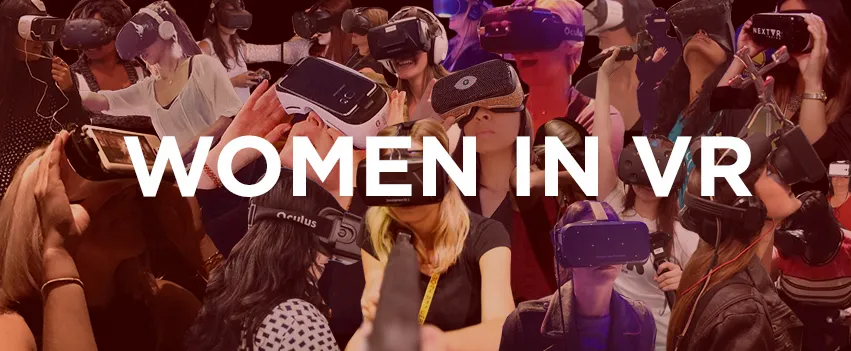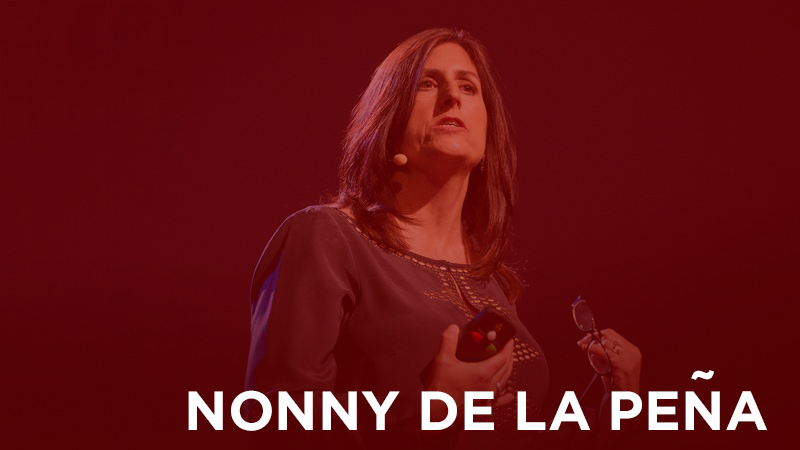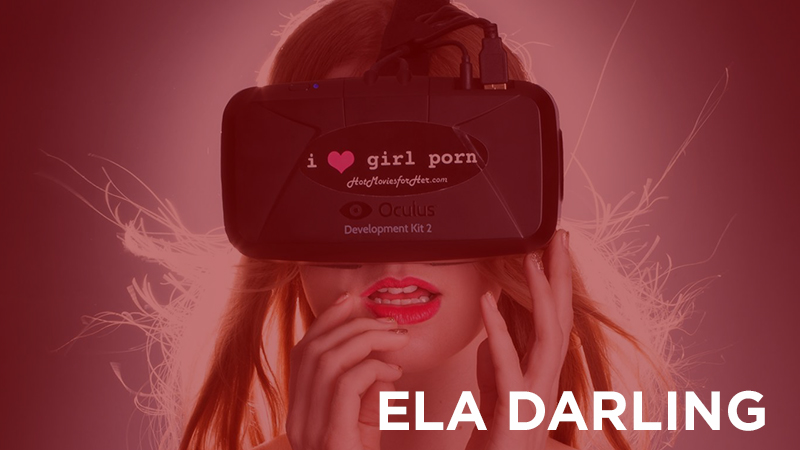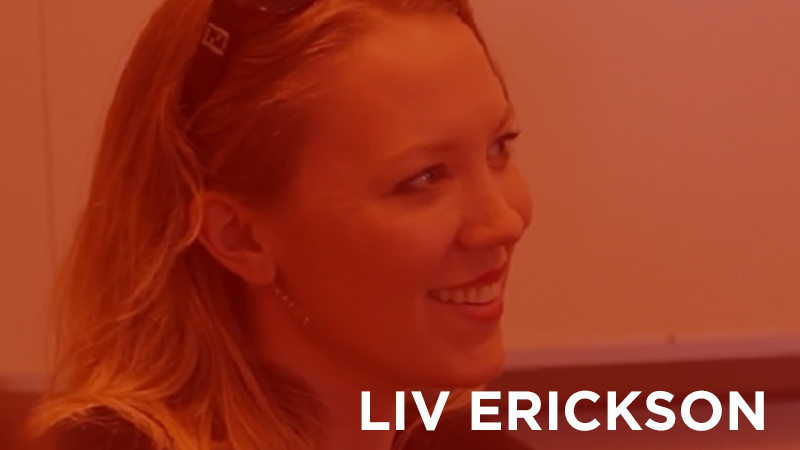Since Facebook’s acquisition of Oculus in 2014, the surge of women entering into the virtual reality space has been awe-inspiring. Working in virtual reality, as the intersection of technology and entertainment (two mediums with tremendous gender gaps), these women have demonstrated intelligence, will, and bravery as they face the unknown and a sea of men. However, given how new virtual reality is, there is a unique opportunity to really have an impact in the way the virtual reality industry is shaped… and women are taking it by storm.
In celebration of International Women’s Day, we wanted to share some of their stories.
“Did your boyfriend make you come here?”
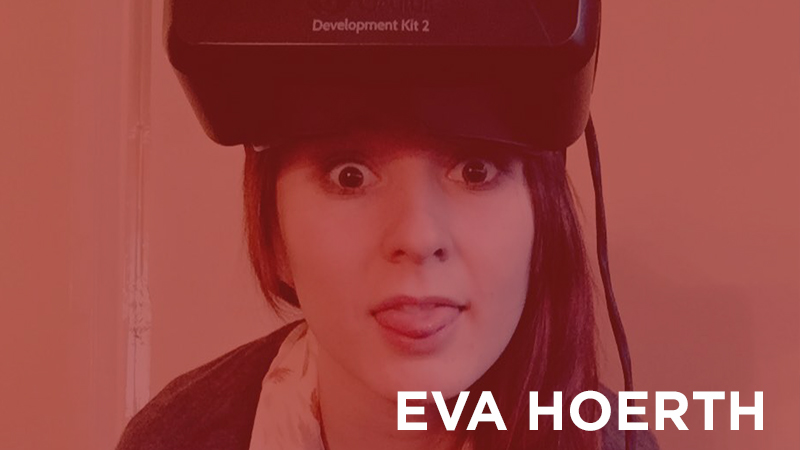
Eva Hoerth (@DowntoHoerth)
Eva is a Design Researcher and Community Builder for VR in Seattle. She works to get students and professionals outside the indie development community to experience VR, and is reaching out to high schools and colleges to get more women involved in the space.
“Did your boyfriend make you come here?” This was a question a man asked me at a VR hackathon last year. It was my first time diving into VR, and coming from a UX background, I was dying to take on design for such an immersive platform. I was not doing it because my “boyfriend told me to.” Now I work as a Design Researcher for VR and I am loving every minute of it.
A few weeks ago, I tweeted a video of a male coworker and I. He was doing goofy hand movements in VR while playing around with Leap Motion’s newest software. I thought it was funny, so I whipped out my camera and gave a sarcastic expression as my coworker reached for what looked like virtual watermelons. It unexpectedly went viral. The video was shared by the Huffington Post, Mashable, and made it to the top of Reddit.
https://www.youtube.com/watch?v=Ogji3nSvPjg
Hundreds (probably thousands) of comments ranged from “clearly she’s jealous that her boyfriend is ignoring her,” “I’m sick of women not accepting technology,” and “B***h” was sprinkled everywhere in between.
Experiencing sexism in the VR space hasn’t really been any different than the attitudes women still encounter in the gaming space. Some people assume that you’re not as much of an expert as the guy next to you. Some people stare at you at events or meetups, but then don’t make eye contact when you approach them. Some people question your credibility in the design space simply because you have boobs. By “people” I’m primarily referring to men.
Not all men are like this. I definitely don’t intend to make that generalization. I actually know more men that are supportive than not in the VR space. I am fortunate to work around a lot of them. If a guy ever treats you poorly because of your gender, look at him as if he’s five years old. Because he is five years old.
My advice to women in VR is to just go out there and make kick ass experiences. Learn something you’ve never learned before. Go demo your projects at events. Write about your work. Tweet it (#WomenInVR). Participate in hackathons. Invite other women to hackathons. Most importantly, be supportive of women and girls that want to get involved and point them to the resources that they need. I’m currently working with other women to build up Seattle’s Women in VR community. We’ll be going to high schools to educate female students about the possibilities in this space. You can do the same!
VR is an incredibly powerful medium, but no one is a VR expert yet. We honestly don’t know what the hell we are doing with this technology which is why it is so important to get all backgrounds involved regardless of gender, age, or expertise. The stronger we stand together, the more impact we will leave for future generations.
We’re going to be in history books, yo.
“Why virtual reality?”
Nonny De La Pena (@ImmersiveJourno)
Nonny de la Peña was selected by Wired Magazine as a #MakeTechHuman Agent of Change and has been called “The Godmother of Virtual Reality” by Engadget and The Guardian. She is the CEO and founder of Emblematic Group.
All my life as a journalist I’ve gravitated towards stories that make a difference, hoping that I can inspire people to care. I’ve written for the New York Times, I’ve worked in documentary, and I’ve worked in broadcast but once I started telling stories in VR, I saw intense and authentic reactions from people that blew me away. Moreover, with VR I could combine all of my main interests–in investigative journalism, creative technologies, inspiring audiences—and bring it together in a very powerful way.
I began my first VR journalism piece, Hunger in LA, in 2010 when I was working as a Senior Research Fellow in Immersive Journalism at the University of Southern California. I was sitting in on a class that was creating a big multi-media project at the University of Southern California called Hunger in the Golden State, looking at the hungry in a state with abundance. It used video, audio, written material that, among other things, took a close look at how food banks were overwhelmed. I decided I wanted to do a VR piece to put people on scene, to make the invisible waiting in those long lines become impossible to ignore.
We had zero funding and virtual reality was seen as a fad. Nobody believed that journalism could be conducted this way, so I had to beg and borrow to make the piece, but we got it done with $700 and a dedicated team of unsung heroes and it was selected for the Sundance Film Festival in 2012. Everyone who experienced Hunger had a deep, visceral reaction to the piece. It became clear that virtual reality was a powerful platform for telling important journalism stories. Since Hunger, we have made pieces on Syrian refugees, Trayvon Martin, domestic violence, and border patrol excessive use of force.
Of course, everyone thought I was crazy. Most women aren’t really taken seriously in the tech world. I’ve worked hard to bring female produced and female focused content to the forefront. Kiya, is a great example because we integrated two separate recorded calls to emergency workers and put the viewer on scene as the tragic events unfold. It’s ultimately a call to action that this should never happen to anyone’s sister again.
Now I really only think in terms of these kinds of spatial narratives and it clear this amazing field is growing. My incredible team at Emblematic Group would all agree that we’re on a crazy rocket ship and all of us are barely hanging on!
“A Safe House for All”
Ela Darling (@ElaDarling)
Ela is the co-founder and face of VRTube.xxx, the world’s first Virtual Reality webcam platform and the first creator of XXX holographic VR porn. After earning a Master’s degree at the age of 21, Ela has spent the last 6.5 years as a feminist, porn performer, star, and political activist.
“I’m a woman involved in the tech industry as well as a female pornographer and adult film star. These are two fields largely dominated and run by men.” – Ela Darling
I’ve experienced my share of slut shame for being a sex worker. I’ve sat through meetings where my male peers “mansplain” my own business to me. I’ve been dismissed by people outright and called a traitor to my gender because of my association with the porn industry. When I decided to embark on a journey through VR porn, I did so with determination and a steel will. I was ready for battle because my experiences with the tech industry taught me exactly where I can expect to stand in the eyes of my contemporaries. I armored myself in the safety of my porn identity and assured myself that I can persevere as much in VR as I have in the adult industry. I was ready to prove myself as I entered the field of Virtual Reality porn.
But I soon realized that I was misguided in this approach. The more I explored the realm of VR, the more the community blew my mind. I didn’t expect other VR professionals to offer a reverent respect for my complex and varied background. I never thought that talking openly about porn in VR would be met with probing questions of “how do you work to make this excellent?” and “how do you create porn that is ethical to both users and performers?” rather than “how do you live with yourself doing what you do?” I learned that there was not one but TWO different initiatives, closely related, for women in this industry: VR Girls and Women in VR. I just spoke at a conference called Versions which had the most impressive ration of men to women in any tech conference I’ve ever attended. The people who ran the conference went out of their way to make sure I felt protected and welcome.
In VR I’ve found a safe space where I can excel and find respect on grounds equal to those of my male peers. I’ve found a group of intelligent, woke women who offer support and camaraderie. I’ve found that people value my insights, experience, and unique perspective as an intersectional marginalized woman. I’ve found that people in massive VR companies silently cheer for me to succeed because my success as a pornographer translates to their success as well. VR has taught me that I can safely put down my dukes, sit down at the table, and get to work on forging a future with like-minded luminaries in this field. And I’m pretty excited about that.
“Balance”
Christina Heller (@ChristinaHeller)
Christina Heller is the CEO and Co-Founder of VR Playhouse, a creative studio and virtual reality production company.
As the CEO of VR Playhouse, I’ve been very lucky. The past two years have been a challenging and exciting roller coaster. We have an amazing team with a core creative staff that has been around since the beginning.
In the early days, we were based in our West Adams home: workstations in every room, group dinners every night, building PC’s on our dining room table. We’ve since moved to a studio in Koreatown. Now instead of home cooked meals, we order Korean BBQ and drink Soju after a long day in the office, of which there are many as interest in VR increases. Nothing makes me happier than watching the guys working together to figure out solutions to very complex problems, and having a blast while do so. But we are mostly that – guys. Like most tech companies, we skew male. It reflects the larger VR community, which is to say, there are women in positions of leadership, but it’s still a whole lot of dudes. Having a woman at the helm of the organization is good, but we admittedly shouldn’t stop there and hopefully this year will bring more balance to our own company and the ecosystem overall. We’ve brought in many women collaborators in the past few months and I hope to keep that momentum going. That being said, as far as dudes go, I have to say I like the virtual reality crew: they’re smart, they’re passionate, they’re funny and progressive. Other than the occasional conference goer mistaking me for a booth babe (which does happen), I’ve been respected and warmly included at every step along the way.
With VR, we get to start from scratch – It’s a new medium, and there are new tools. With this newness we have the opportunity to create a culture that is a more accurate reflection of the world in 2016; it’s not just a moral imperative – It’s good business. Everyone consumes media, everyone uses technology, and everyone spends money on it. Particularly when it comes to content (VR Playhouse’s core business), we’d be foolish to limit our worldview to that of one gender, race, or economic class. Content itself has a snowball effect – The more content that is made for a diverse fan base, the more talent from across the spectrum will choose to work in our industry. If VR can maintain a commitment to inclusiveness and diversity, our industry can lead the way as a model for modern business ideals. It’s a complex issue, but if any industry can solve complex issues, it’s ours.
“Finding My Voice in VR was Hard, Until I realized I was not on My Own”
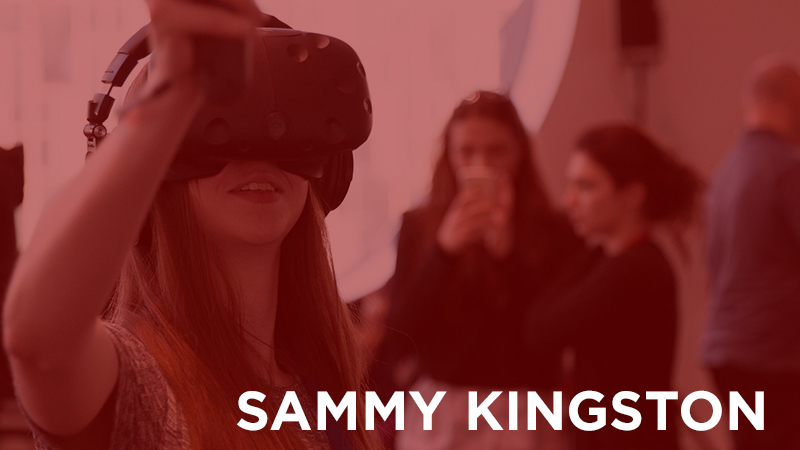
Sammy Kingston (@K_Samantha1)
Samantha Kingston is the Founder & Client Director at the UK based agency Virtual Umbrella. Virtual Umbrella is a marketing and PR company specialising in the VR industry. VU runs a number of VR events across the UK and Samantha is an advocate for representing Women in VR & Innovative technology.
I have been working within the Virtual Reality industry for just over 2 and half years now, it has been one of the most exciting and rewarding industries to work in. Before I ventured into the world of Virtual Reality and Gaming, the thought of my gender playing a role in my career never really crossed my mind. I think I had been lucky to not experience any gender bias previously, however the issue hit me hard in the face when I jumped into the gaming world. There would often be arguments about #GamerGate, pay differences between men and women and event days specifically for representing women in games.
Creating my company, Virtual Umbrella in early 2015, opened my eyes to gender issues that were circulating in the VR community. I remember one of the first VR events I ever went too, and thinking am I the only women here? I was. I didn’t feel alone, as I was welcomed into the community with open arms and have made some incredible friends. However the search for other women excited about the industry like me was always on my mind. This was always a hot topic to talk about when I attended events. There was not always women speakers or women leading panels, especially in the UK, event organisers have been working hard to amend this.
The only issue I have personally found, working in the industry, is trying to find my own voice in a growing community. In the first couple of months of my company, I found that being enthusiastic and passionate about VR didn’t always get me the right kind of attention, especially online. Reddit, a hard critic as we know, was the first place my gender was brought in. I was shocked. I started to feel frustrated that I could not post my own opinions about the industry without worrying about my gender being talked about. I would have internal arguments with myself about issues, but could never have the confidence to post, worrying that my opinions where not important. I had a couple of experiences when meeting people for the first time, if I was with one of my male colleagues, I would be completely ignored in the conversation. Overlooked as if I was just an “intern” or they say “Oh sorry, didn’t think this tech talk would interest you”. On occasion I had to stick up for myself and state the obvious, I would always get an apology and most of the time they really didn’t realise, but it shouldn’t be the way.
It was finding support in the existing community, just talking about how I felt, really made a difference. My voice did matter and I started hunting for other women in the industry. Supporting them and giving them a chance to get their voice heard, offering speaking opportunities, introducing them to others in the field or offering the support I once longed for. I started reaching out and writing about the Kickass women in the VR industry for the tech publication Gadgette in the UK. I heard some incredible stories of these ladies experiences and the work they were contributing to the industry. They inspired me.
Although I have had a couple of bad experiences, this industry It is trying from the start to be as good as it can be – there are some fantastic groups out there on Facebook and Twitter that offer incredible support and advice for women and men in the industry. Unlike other industries, the VR community is working hard to make sure women are included and represented. This is making a huge difference, I really look forward to meeting more women over the next year to talk about our passion. If you are feeling a bit lost, reach out, there are loads of us here waiting to meet you.
Liv Erikson (@misslivirose)
Liv Erickson is a vr/ar developer and evangelist at Microsoft based out of the Bay Area with a passion for helping people get immersed in AR & VR technologies. She is the developer of KittenVR, author of The Matrix is my Office, and host of the developer web series Just A/VR Show.
Two years ago, I had this moment where everything clicked and I knew that I had to start building for VR. My first experience on the DK 2 was a lightsaber training demo, and I was sold – I had just had a chance to live out a childhood dream of mine. Immersive technologies have the capability to completely reshape how we blend technology into our lives, and these experiences will touch everyone in the world within our lifetimes. Everyone, regardless of their age, experience, gender, background – you name it – has a unique experience that leads to a new and interesting perspective when creating virtual experiences.
I’ve often been approached with the question: “But I’m not a gamer, what does VR have to offer me?” It’s important that we’re showcasing all of the different ways that virtual and augmented reality is touching different industries. We’re building an amazing new technical ecosystem of devices and experiences that make the digital world so much more human, and there’s a growing interest in the technology, especially in communities that are underrepresented in our industry now.
“Those of us already in the industry need to make sure that there are clear paths for those who want to start building virtual and augmented reality applications to create well-balanced experiences for everyone.”
When I first started developing for virtual reality, I wanted to be as transparent about my experience as possible, mistakes and all, to help demystify the learning process and make the path to joining the VR industry more relatable to other women. That’s always been my goal withThe Matrix is my Office and Just A/VR Show – this technology is all about celebrating new ways of storytelling and cultivating new perspectives, and everyone has a different story that brings them there. I’ve been working with AR/VR Women to launch an educational initiative to teach VR and AR design and development to a group of women here in San Francisco, and we’re hoping to be able to take that and make it accessible to anyone around the world who wants to learn about building an immersive experience. AR and VR technology truly is for everyone, and it’s important that we’re cultivating an industry where everyone is welcome and feels as though they are able to accomplish what they set out to create for it. I’ve been so fortunate to be surrounded by so many women and men alike who value diversity in this field, and I think that VR and AR as an industry is truly in a position to enact a lot of positive change around highlighting new voices and experiences for all.
Some Words of Encouragement from a few Women in VR

Helen Situ (@HelenSitu)
“The most powerful way that I’ve felt supported in my ambition and career is through the mentors I can turn to. I’ve been blessed to find supportive mentors within each company and within the industry.”
Thank you for having me share a bit about my experience for International Women’s Day — I’m Helen Situ. I’m the Virtual Reality Evangelist at NextVR, a leader in live virtual reality experiences. We’ve broadcasted events from the NBA, Premiere Boxing, CNN, and recently announced a 5-year deal with FOX Sports. This coming weekend, FOX Sports and NextVR will be broadcasting the BIG EAST men’s basketball tournament with 7 games over 3 days live in virtual reality.
I jumped into working in startups my junior year at the University of California, Berkeley (2011). Two of the startup teams I’ve joined were under 10 people and all-male. I’ve been focused on product, user experience, and social media marketing and am adaptable to the many industries that innovative technologies touch. For example, at NextVR, I’ve had the opportunity to work with leaders from sports, entertainment, broadcasting, advertising, and many more.
Here are 2 powerful ways to strengthen your network and find support as a Woman in Technology (both of these have worked quite well for me):
1) Be proactive: Attend events and join industry organizations.
It has been incredible to build relationships proactively with women in technology leaders through events and industry organizations. Great places to do this are through Meetups (SVVR, SFVR, VRLA) and the Facebook Women in VR group.
2) Create your personal brand: Make it easy for people to learn from you and be inspired by you.
I encourage women to share their insights and stories publicly across blogs and social media. Using both of these mediums have also brought me countless opportunities to speak at conferences and roundtables. Again, underlining exposure opportunities for women in technology.
I’d love to hear from you, say hi on Twitter @HelenSitu or read more about my experience in my most recommended Medium article, “Why I Uprooted My Life For Virtual Reality.”

Camille Kanengiser (@Camille_K_)
Camille Kanengiser is the CoFounder and CCO of Freeform Labs, a VR/AR content company focused on inspiring creativity, mastery, and exploration through interactive immersive experiences. She is a graduate of USC’s Cinema School with a degree in Animation & Digital Arts.
“VR/AR is an exceptionally accepting, collaborative, and forward-thinking community. By having these conversations about gender parity and diversity now, we’re setting the foundation for progress.” – Camille Kanengiser
Our different experiences, cultures, and outlooks will build stronger teams that create better outcomes. If we equip upcoming generations with the mindsets and skillsets to jump into new technical or creative fields, we’ll be looking at a more diverse landscape in the near future. It’s encouraging to see how many women’s groups and initiatives have been established, especially in recent years. We’re definitely on the right track – I’ve seen more women at each event. Reach out to other women and help lift them up along with you. We’re just as creative, just as motivated, and just as brilliant as the men we work with – don’t let anyone, including yourself, have you believe otherwise. This industry has been, and will continue to be, one of the most multi-disciplinary technology spaces. My skills are rooted in art and animation, so I approach VR from a visual design perspective. It fit perfectly with the business experience and engineering expertise of my fellow Freeform Labs cofounders. Whatever your background is, there’s a way to weave that into the tapestry of the industry. Start building now.
“For women everywhere, if you want to get into virtual reality, please don’t be intimidated by the amount of men you see. We are here. And we are here to collaborate and share ideas with you. Diversity starts at the beginning, and we, the women of vr, hope that this is an industry that you can see yourself thriving in because you can and you will.” – Jenn Duong and Julie Young, Co-Founders of Women in VR (@jenndefer and @juliey4)

